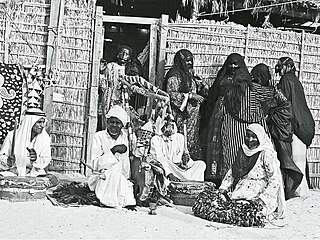
Demographic features of the United Arab Emirates (UAE) include population density, vital statistics, immigration and emigration data, ethnicity, education levels, religions practiced, and languages spoken within the UAE.

The United Arab Emirates (UAE), or simply the Emirates, is a country in West Asia, in the Middle East, at the eastern end of the Arabian Peninsula. It is a federal, elective monarchy composed of seven emirates, with Abu Dhabi as its capital. It shares land borders with Oman to the east and northeast, and with Saudi Arabia to the southwest; as well as maritime borders in the Persian Gulf with Qatar and Iran, and with Oman in the Gulf of Oman. As of 2024, the UAE has an estimated population of over 10 million, of which 11% are Emiratis; Dubai is the most populous city and is an international hub. Islam is the official religion and Arabic is the official language, while English is the most spoken language and the language of business.

Achomi, also known as Khodmooni and Larestani, is a Persian and Southwestern Iranian language spoken by people in southern Fars and western Hormozgan and by significant numbers of Ajam citizens in the UAE, Bahrain, Kuwait, and other neighbouring countries.

Bastak County is in Hormozgan province, Iran. Its capital is the city of Bastak.

The Ajam of Bahrain, also known as Persians of Bahrain or Iranians of Bahrain, are a collection of ethnic groups in Bahrain composed of Bahraini citizens of Iranian ancestries (Iranic) and origins.

Al Satwa or simply Satwa, is a community in Dubai, United Arab Emirates, comprising high-density retail outlets and private residential dwellings. It is located southwest of Bur Dubai and borders Jumeirah to the north. E 11 forms the southern boundary of Al Satwa. Notable landmarks include the Iranian Hospital, Satwa Grand Mosque and the Al Satwa bus terminal.

The Emiratis are the citizen population of the United Arab Emirates. Within the UAE itself, their number is approximately 1.15 million.

Achum people, or simply Acham, also known as Khodmooni, Lari, or Larestani people, sometimes also referred to as Garmsiris, are an Iranic sub-ethnic group of Persians who inhabit primarily in southern Iran in a region historically known as Irahistan. They are predominantly Sunni Muslims, with a Shia minority.

Relations between the neighboring countries of Iran and the United Arab Emirates (UAE) are deeply historic, dating back centuries prior to the establishment of the modern-day United Arab Emirates; however today are shaky and unpredictable. Both the countries maintain diplomatic relations with each other, having embassies in each other's capitals.
Kukherdharang District is in Bastak County, Hormozgan province, Iran. Its capital is the city of Kukherdharang.
Huwala also collectively referred to as Bani Huwala, is a blanket term usually used to refer to Iranian Arabs of tribal lineage who initially migrated to Iran in the 13th and 14th century and intermixed with the indigenous population of older Arabic-speaking background. Such migrations continued till around 19th century to the area which is now Iran's Hormozgan Province and Fars Province, mainly Bandar Abbas, Qishm, and the mainland near Bandar Lengeh. The Huwala follows Sunni Islam, as opposed the majority Persian Twelver Shia and similar to Sunni Peninsular Arabs. Most of the Huwala have remigrated back to the Arabian Peninsula between late 19th century and early 20th century. The imposition of restrictive economic policies by Reza Shah in the 1930s led to the migration of most of the Huwala back to the Arabian Peninsula.
Harang Rural District is in Kukherdharang District of Bastak County, Hormozgan province, Iran. Its capital was the village of Harang, which merged with the village of Kukherd to become the city of Kukherdharang.
Kuhij is a city in the Central District of Bastak County, Hormozgan province, Iran.
Harang was a village in, and the capital of, Harang Rural District of Kukherdharang District, Bastak County, Hormozgan province, Iran.
The 'Ajam of Kuwait, also known as Persian Kuwaitis, are Kuwaiti citizens of Iranian descent. The majority of Shia Kuwaiti citizens are of Iranian descent, although there are Ajam Kuwaitis who are Sunni.
Baloch people in the United Arab Emirates comprise residents of the United Arab Emirates of Baloch ancestry, whose ancestral roots lie in Balochistan. Like Balochs in other Gulf states.

Al-Balushi is a surname common in Gulf Arab states mainly derived from the term Balochi, typically denoting Baloch ancestry from Balochistan.
Kuwaiti Persian, known in Kuwait as ʿīmi is a combination of different varieties of the Persian language and Achomi language historically spoken in Kuwait. Kuwaiti Persian has been spoken for generations, especially in the historical Sharq district of Kuwait City, where Iranian families had settled.

Afro-Emiratis, also known as African Emiratis and Black Emiratis, are Emiratis of full or partial Black African and Afro-Arab descent. They are mostly concentrated in the Northern Emirates. Despite their minority status within the broader Emirati population, they have a significant historical presence and cultural contribution, especially in sports and music.

Sultaniz or Sultanies were a musical band of Bahraini Iranians who published songs in Persian (Farsi), and folklore songs of Laristan in Achomi and Arabic. This group is known in Bahrain as "Sultaniz/Sultanies group". The first album of this group was released in 1989 and the last album was released in 2003. The main singer of the group was "Ahmad Sultan".


















